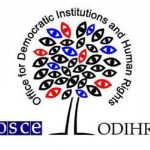- 15 April, 2020
- Elections

The Union of Informed Citizens Stepanakert Office conducted a short-term observation mission during the first round of national elections in the Republic of Artsakh on March 31 and the second round on April 14.
Candidates Arayik Harutyunyan and Masis Mailyan ran in the second round of elections based on the results of the first round. The latter, however, called for a boycott of the elections.
Methodology
There were 282 polling stations in the Republic of Artsakh (including one in Yerevan). In the first round of elections, 113 short-term observers (including 9 mobile groups) from Armenia and Artsakh observed 49 polling stations (of the total of 281) in all the regions of Artsakh, as well as the work of all the 8 Territorial Electoral Commissions.
In the second round of elections, 65 observers were involved in the mission. The latter followed the election process with the help of video cameras installed in 48 polling stations, and 3 groups carried out a mobile observation. The change in methodology was related to the force majeure situation created by the spread of the new coronavirus disease in the Republics of Armenia and in Artsakh.
Monitoring of the work of the media, the law enforcement system and limited monitoring of voter lists was also conducted within the framework of the mission.
Election administration
A few days before the elections, with the financial support of the Government of the Republic of Artsakh, with the efforts of the Human Rights Defender and Public Television, and with the advisory support of the Union of Informed Citizens, video cameras were installed in all polling stations of Stepanakert and regional centers (a total of 48 polling stations). Although there is no legislative requirement for video broadcasting, this (despite all the technical shortcomings) provided an additional opportunity to monitor elections through image and voice broadcasting, increasing the transparency of the elections.
For the most part, the electoral commissions had quite a limited knowledge of the electoral legislation and the CEC decisions. Nevertheless, the election commissions were generally willing to cooperate with mobile observers, and many of the shortcomings identified as a result of their lack of knowledge were eliminated at the suggestion of observers. Often a state of negligence could be observed in precinct electoral commissions, with no real lottery of distribution of responsibilities, cases of getting acquainted with voter lists, issues related to the furnishing of the polling station, and so on.
Although in the first round of elections the mission registered significant violations by the Artsakh Police in terms of running, compiling, publishing the voter lists, and in terms of ruling out instances of the same person being included in the list twice (which is being investigated by the Special Investigation Service), no recurrence of such issues was observed in the second round of elections, and the voter lists were published in full.
However, the Police of the Republic of Artsakh did not take appropriate measures during the pre-election period to prevent and detect crimes committed during the voting day (including operative-investigative measures), which can be perceived as a deficit of justice and an atmosphere of impunity. However, the Prosecutor General’s Office registered the main violations, and criminal proceedings were instituted (including on the basis of our crime reports) in a number of cases.
No violations were found during the observation of the voting in the “Shushi Penitentiary Institution” of the Police Penitentiary Department. In contrast, the number of police officers present without the invitation of the chairman of the commission increased significantly both during the morning session, during the voting and during the counting of votes.
Stepanakert Municipality furnished all the polling stations of the capital with ramps, which significantly facilitated the exercise of the suffrage for citizens with mobility problems.
Violations recorded in the second round of elections
Observers at the polling stations recorded the following violations at 07:00 to 08:00: in 16 polling stations members of precinct electoral commissions did not wear badges; in 14 polling stations police officers entered polling stations without the order of the chairman of the precinct electoral commission; in 10 polling stations unknown people without the right to be in the polling station were present in there. It should be noted that the lottery of the commission’s functions was mostly not carried out properly, and in 11 polling stations, the session took place outside the voting room (in another room).
As of 2 pm, according to the preliminary results of the observation through live broadcasts from 48 polling stations, the observation mission recorded the following irregularities:
- 80 cases of the presence of a person without the right to be at the polling station, including numerous cases of police officers present in the voting room;
- 86 cases of persons in the polling station not visibly wearing the badge (including PEC members);
- 260 cases of voters filling in the ballot paper outside the voting booth or folding it;
- 9 cases of voters taking photos of their voted ballot papers;
- 21 cases of taking over the responsibilities of the chairman of the precinct electoral commission;
- 15 cases of accumulations of people in the voting room.
The following irregularities were recorded during the vote count session:
- Interruption of the vote count session in 2 polling stations;
- 11 cases of the presence of a person without the right to be present at the session (in 6 polling stations);
- 27 persons not visibly wearing the badges during the vote count (in 12 polling stations);
- 17 cases of police officers entering the voting room without the order of the PEC chairman (in 7 polling stations);
- 36 cases of violation of the procedure of vote count in 11 polling stations.
In the two polling stations observed (No. 4/2 in Martakert and No. 1/30 in Stepanakert), it was obvious from the video broadcast that many voters were circulating some additional ballots in the voting booth, which is apparently similar to the “carousel” of ballots (a type of controlled voting, when the voter is given a ballot paper and is required to throw it in the ballot box, and to take the received empty ballot paper out of the polling station). These cases can be fully disclosed only through an investigation, and a relevant crime report has been submitted to the Prosecutor’s Office.
In addition to the aforementioned irregularities, it should be noted that from 7:00 to the end of the vote count session, in violation of the procedure established by the Central Electoral Commission of the Republic of Artsakh, the participants of the electoral process did not wear personal protective equipment in 285 cases.
No serious quarrels or scuffles were observed at the polling stations. In Stepanakert, the observers also calculated the number of people entering the voting booth with the voter, and that number did not significantly differ from the number of assistants registered in the registers.
In 10 polling stations, the number of voters was counted, which in the case of 8 polling stations was very close to the official results, and in the other two polling stations there was a significant difference (however, in one of the two polling stations there was a connection failure).
During the day there were issues in terms of visibility and broadcasting of cameras in more than 10 polling stations, but they were largely solved by the precinct electoral commissions, technical staff and mobile groups of our observers.
Analysis of voting results
In the first round of elections, the turnout was 70% in urban communities, 76% in rural communities (the difference was 6%), while in the second round it was 35% in urban communities and 56% in rural communities (the difference was 21%).
Moreover, voter turnout in 22 polling stations (all in rural communities) was higher in the second round, then in the first round, which has no reasonable sociological or political explanation.
It should be noted that the urban communities were the ones equipped with cameras. There was no camera broadcast from any rural area. No observation was conducted in those rural areas, and no opposition proxies were present at the polling stations.
The inexplicably high voter turnout in rural polling stations raises more concerns in the light of the spread of the new coronavirus disease and the lack of competition in the second round of elections.
The aforementioned circumstances suggest that there have been gross violations in most of the polling stations not controlled by civil society and the opposition.
Voters’ free expression of will
It should be emphasized that the Union of Informed Citizens did not conduct a long-term observation mission. However, a long-term observation mission was conducted by our partner “Akanates” observation alliance, which raised concerns about the use of administrative resources and charity during the campaign process. Many individuals have also alerted the Union of Informed Citizens Stepanakert Office about charity activities during the election campaign and associated with certain candidates. Very often the charity activities were expressed in the form of provision of construction materials and within the framework of other government programs. However, it was presented as support provided by one of the candidates. These circumstances give grounds to think that there was exertion of influence on the will of the voters prohibited by the electoral legislation.
These concerns are compounded by the numerous violations of the secrecy of voting on election day. Moreover, given the circumstance that those violations are of a latent nature, and, as a rule, were rarely observed by observers, we can assume that they were much higher in number than it has been observed. Thus, it is not possible to give an accurate estimate of the overall picture. Accordingly, it is impossible to give an exact quantitative assessment of the percentage of voters in the Republic of Artsakh who, being constrained by the charity they received or the administrative levers applied to them, were not able to express their real will in the voting booths.
Conclusion
Thus, it can be said that the national elections in Artsakh took place in a competitive environment, but the degree of fairness of that competition differed significantly from the requirements set for elections in democratic societies.
Both during the pre-election period and in the first and second rounds of elections, there were violations that could have had a significant impact on the results of both the parliamentary and presidential election.
Although the authorities of the Republic of Artsakh made significant efforts to ensure the transparency of the elections, there was a lack of political will to fight against violations (for their prevention and disclosure).
Persons who have committed electoral crimes should be prosecuted, and the Union of Informed Citizens will follow closely on the matter.
The electoral legislation, the electoral system and electoral administration of the Republic of Artsakh need significant reform. The commendable practice of video broadcasting from the polling stations and their furnishing with ramps should be further developed.
Union of Informed Citizens Stepanakert Office




